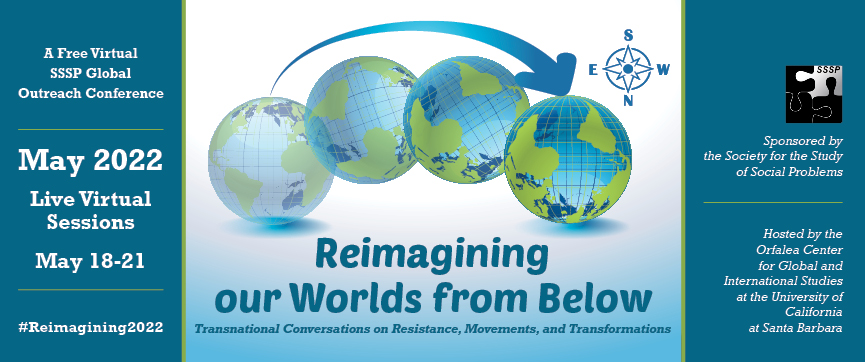Reimagining Our Worlds from Below: Panel 2

#Reimagining2022
***
Engaging Global South Knowledge Creation and Practices as Forms of Resistance
May 18, 2-3:30p UTC
Critical literature calls us to pay attention to the process of “ignorance of other forms of knowledge” as a form of a privilege afforded to some, but not to the majority of those who live in the Global South. These circumstances are presented when extensive knowledge creation across different spaces of the Global South is still not adequately acknowledged and included within the canon of education, training, practice, and knowledge production. It is accepted that globalization affects these spaces differently, a situation that has become more evident with Covid 19 sharing (or not) of resources, including vaccinations. There are many examples from the Global South that medical, community engagement, social movements, intersectionality, indigenous resurgence and other forms of resistance have been ignored, both formally and informally.
This session welcomes views from practitioners in any social area of practice, activists, researchers, academics or members of social movements located in the Global South space or strongly connected to it. We particularly welcome contributions that introduce “other forms of knowledge” based on “Ubuntu,” “BuenVivir,” decoloniality of knowledge, and different decolonizing processes, among others. Contributions may provide examples of how to delink from Euro-North American centric worldviews and their “coloniality matrix of power.” Together, we want to understand the Global South “from within” and discuss people’s everyday living experiences with globalization.
Session organizers: Henry Parada, Ryerson University (Toronto, Canada) and Kevin Cruz, Universidad Nacional Autonoma de Honduras (Honduras)
Click on the presentation name to link to abstract and presenter bio.
Jennifer Friedman and Laurel Graham, Associate Professors, University of South Florida, Department of Sociology (USA)
“Justice for Traditional Knowledge: From Legal Pluralism to Ecology of Knowledges“
Wendy Marilú Sánchez Casanova, Escuela Nacional de Estudios, Superiores, Morelia (Mexico)
Joel Federman, PhD, Chair of the Department of Transformative Social Change at Saybrook University (USA)

Hi everyone! I am the 2021-22 Chair of SSSP’s Transnational Virtual Initiatives Committee, the group that organized this conference. I am excited that our conference is finally here and we have a chance to hear from people who care about social problems around the world.
I wish you a good conference. I hope you will join us in this forum, just introducing yourself and sharing your thoughts, insights, questions and your own work. Welcome!
Hello everybody
I want to welcome you to session 2. We are looking forward to our discussion. The format is flexible; the main idea of the format is to be open to questions and discussion. It would be great if you could highlight key ideas from your presentation (optional) for five to ten minutes, or we can decide as a group to move directly to questions.
Take care
Henry
Hello everybody
Thank you very much for our fantastic conversation, a lot of issues were nicely discussed. Congratulations on the work you all are doing.
Hello!
In fact, it was an inspiring conversation.
I learned a lot.
Thanks to all of you.
Wendy.
I want to say two things that I thought about but didn’t say in the live session.
First, when discussing the question of digital natives and digital immigrants, we talked about material limitations that many face. The other limitation is language. English speakers have a distinct advantage in much of the digital world and where other languages dominate, it is rarer for non-natives to be able to participate. For example, while I am guessing, it would not surprise me that Chinese languages dominate in significant portions of the digital space, but it is probably not spaces that many non-Chinese native speakers come because a lot fewer people learn Chinese languages as second languages. Whereas in English-speaking spaces, there are significant portions of English as a second language speakers who bring their own cultural experience to the table. This, of course, has a lot to do with the history of colonialism and imperialism. But when thinking about indigenous persons in the digital world, it also has provided an opportunity. Indigenous persons often share English as a second language in a wide part of the world (with Spanish being the second share language). This is weird twist of colonialism, because it allows groups of people who did not have common languages but were commonly occupied and oppressed to find each other. (example: https://www.culturalsurvival.org/publications/cultural-survival-quarterly/indigenous-peoples-network) So all this left me wondering how much this trickles down to the daily lives of indigenous persons? Is this something that only upper echelons of indigenous leadership are a part of or is this something that becomes integrated into meatspace as we were discussing about the generational differences.
My second thought from this morning’s live sessions:
Henry spoke of humility as an important value in building global solidarity (per Joel’s presentation). I would add that gratitude may also be needed. Specifically, gratitude by those who descend from colonizers who have benefitted greatly from the colonial past. I wonder how different discussions about reparations and decolonization would change if there was a basic understanding of how much modern life owes to these exploited persons.